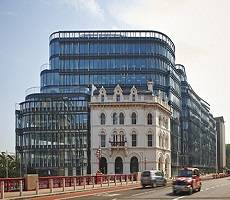July 11, 2014
6 Bevis Marks, the Gherkin’s new neighbour, is ready for tenants
 6 Bevis Marks – next to the Gherkin in the City of London – has been completed, with the first two tenants expected to take occupation in August. The mixed use building comprises 160,000 sqft (14,864 sqm) of office and retail space over 15 floors, and has been developed in a joint venture between AXA Real Estate and BlackRock. Located close to Liverpool Street, where the new Crossrail station is due to open in 2018, the building features a rooftop garden square, a ground floor business lounge, full on-site cyclist facilities and a private landscaped courtyard with access to the public realm surrounding the Gherkin. The development also features a 26-screen media wall in the reception, which is being used to host the Vivid Digital arts programme – a commission of young filmmaking talent supported by the developer. The building is BREEAM Excellent rated, with a range of sustainability features. More →
6 Bevis Marks – next to the Gherkin in the City of London – has been completed, with the first two tenants expected to take occupation in August. The mixed use building comprises 160,000 sqft (14,864 sqm) of office and retail space over 15 floors, and has been developed in a joint venture between AXA Real Estate and BlackRock. Located close to Liverpool Street, where the new Crossrail station is due to open in 2018, the building features a rooftop garden square, a ground floor business lounge, full on-site cyclist facilities and a private landscaped courtyard with access to the public realm surrounding the Gherkin. The development also features a 26-screen media wall in the reception, which is being used to host the Vivid Digital arts programme – a commission of young filmmaking talent supported by the developer. The building is BREEAM Excellent rated, with a range of sustainability features. More →






























